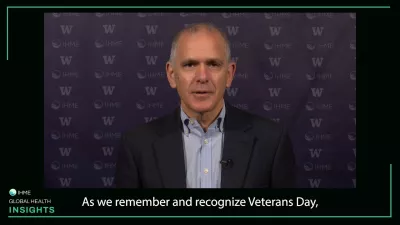This transcript has been lightly edited for clarity
As we remember and recognize Veterans Day, it's important to reflect where it came from. It's remembering the armistice for World War I and the sacrifice made by veterans on all sides in that devastating war. And I think the notion of conflict as one of the big contributors to ill health around the world, both in veterans themselves because of the physical trauma from war, because of the mental health issues that come from being in wars, and of course, on civilians, both directly being involved in conflict and on the impact of conflict on health systems and health services.
And in the intervening years since World War I, I think we have learned more about the role of conflict as a fundamental public health challenge. There's literature on this now in the academic side, and there's recognition that it's very hard to have health in a world where there is conflict. Peace is a, sort of, ingredient number one in many ways for a healthy society.
And we see that around the world in many places today, unfortunately. If we look back and compare the magnitude of conflict as a driver of health in veterans in civilian populations around the world, it has at times been really large. The genocide in Rwanda shows up when we look at numbers for the globe, it really moved the global assessment of health, let alone what it did and was so devastating in Rwanda.
And we've seen other conflicts or social unrest with similarly enormous effects going back to the 1960s, when we think about the great famine in China, not really grounded in a conflict, but did have associated with it huge degrees of civil unrest. So recognizing that, you know, on this day of remembrance, that conflict can be such an integral part of ill health also gives us a perspective about the future.
When we think of the big threats to health in the 21st century, conflict and the escalation of conflict, certainly has to be there. And of course, we have the greatest degree of that threat would be if conflict somehow devolved into nuclear escalation. And then we get into the realm of even perhaps existential threats, given all the environmental consequences of the possibility of nuclear war.
So, in any balanced view of the challenges for global health, we really do need to put conflict and the avoidance of conflict and managing the ill health in veterans and in civilian populations front and center, as an issue that we need to tackle as a global health community. So give us pause for remembrance of armistice, way back in 1918 and think about how we promulgate peace around the world and reduce conflict as we go forward.

